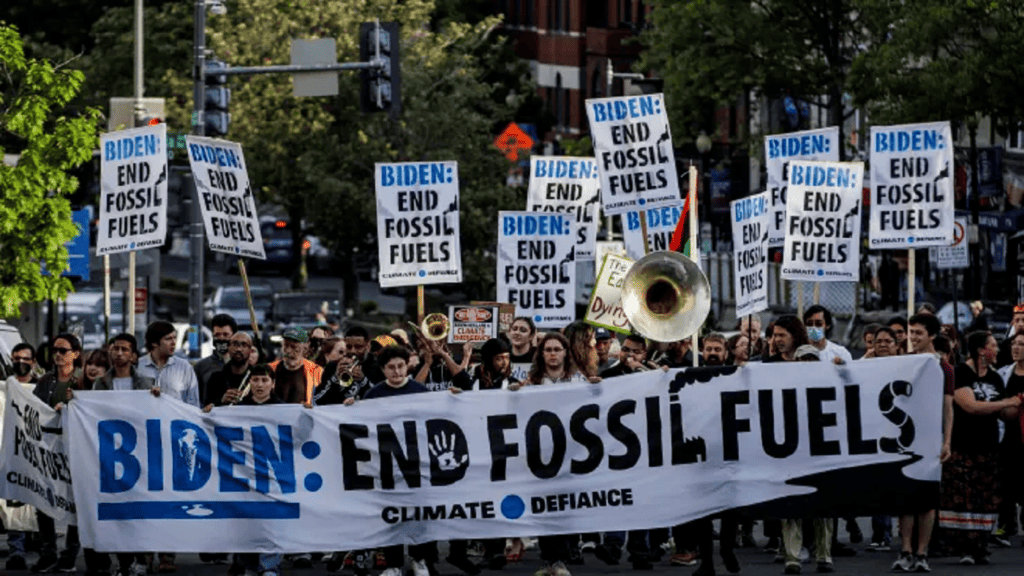
implications In a groundbreaking move away from fossil fuels, U.S. policy has come under international scrutiny, with advocates urging President Joe Biden’s administration to lead the global transition towards cleaner energy technologies.
In a historic development, government ministers from nearly 200 countries approved the global stocktake agreement on Wednesday, marking the first time in nearly three decades that nations are called upon to distance themselves from fossil fuels – the primary contributor to the climate crisis.
COP28 President Sultan al-Jaber hailed the agreement as a significant milestone during his closing speech, with the European Union expressing satisfaction in what they described as the “beginning of the end” of the fossil fuel era. However, the absence of an explicit call to phase out or reduce fossil fuels disappointed civil society groups and scientists, while a group of small island nations criticized what they perceived as a “litany of loopholes.”
The lack of a clear commitment to either “phase-out” or “phase-down” fossil fuels left room for interpretation. A “phase-out” commitment would have implied a complete elimination of fossil fuel use, while a “phase-down” agreement would have signaled a reduction in usage without an absolute end.
U.S. climate envoy John Kerry acknowledged the strong message sent to the world by the COP28 agreement but did not disclose specific details of adjustments to the long-term strategies of the United States and China. This development comes at a time when the U.S. stands as a leading oil and gas producer, with projections indicating a record extraction in 2023.
According to the U.S. Energy Information Administration, American oil output hit a new peak of 13.2 million barrels per day in September, surpassing heavyweight producers such as Saudi Arabia and Russia. The COP28 deal is seen as a signal for policymakers, urging a shift in the outlook for fossil fuel use between now and 2050.
Jason Bordoff, director of the Center on Global Energy Policy at Columbia University, emphasized the need for the U.S. to expedite the implementation of the Inflation Reduction Act, expand clean energy initiatives, and reduce demand for fossil fuels.
As environmental organizations call for action at the national level, Jean Su of the Center for Biological Diversity emphasized the role of the U.S. in leading the charge against oil, gas, and coal projects. The COP28 deal, according to experts like Nikki Reisch from the Center for International Environmental Law, should guide countries towards decisive actions outside international forums.
While the Biden administration has made strides in climate investments, passing the ambitious Inflation Reduction Act, it continues to face criticism for simultaneously increasing oil and gas production. The administration’s rationale revolves around stabilizing fuel prices, especially in the aftermath of global events such as Russia’s invasion of Ukraine.
Despite these challenges, the U.S. remains committed to climate goals, with Biden warning against denying the impact of climate change. The administration’s ambitious climate investment is expected to channel significant funds into accelerating the country’s energy transition and reducing emissions by 40% this decade.
However, the White House has been under scrutiny for its simultaneous push to expand fossil fuel production. As the world watches, the COP28 deal’s effectiveness will depend not only on the commitments made within international forums but also on the concrete actions taken by nations outside these arenas.
Conclusion
The COP28 agreement has initiated a global pivot away from fossil fuels, placing the United States at a critical juncture. With oil and gas production reaching unprecedented levels, the nation must navigate the challenges posed by its commitment to cleaner energy and the realities of meeting domestic energy demands. The road ahead requires a delicate balance between economic considerations, environmental stewardship, and international climate responsibilities. The coming months will undoubtedly shed light on how the U.S. shapes its energy future in the aftermath of the COP28 deal.

